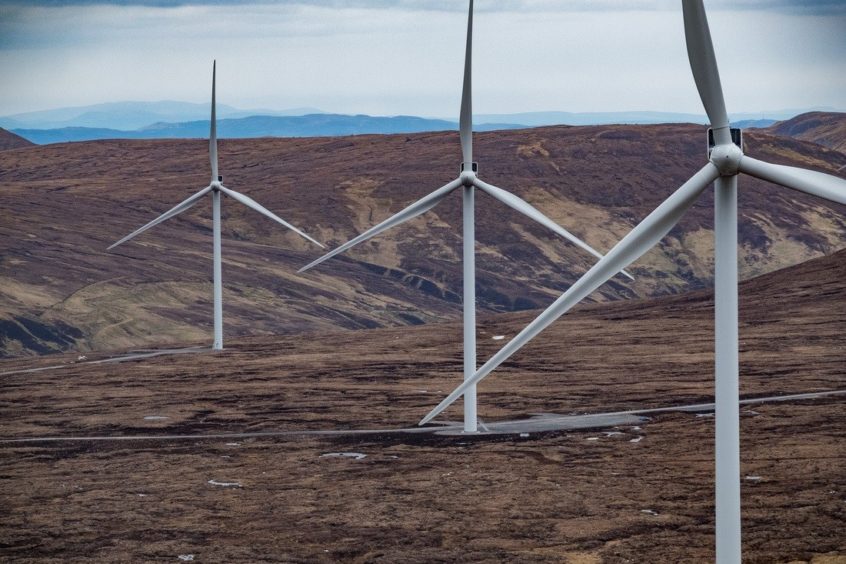
Scotland is facing a “planning logjam” which could jeopardise the country’s 2045 net zero targets, according to new research.
A study carried out by industry body Scottish Renewables found the number of planners employed across Scotland’s 32 councils has fallen by 20% in the last nine years, from 1,515 in 2011 to 1,216 in 2020.
That’s despite a predicted rise in the number of green energy applications that will need to be rubber stamped in the coming years.
According to Scottish Renewables, the UK must quadruple the amount of renewable electricity deployed by 2050 in order to meet its climate change targets.
The report shows that, in the past decade, Scotland’s renewable energy capacity has grown from 2.8 gigawatt (GW) to 11.6GW.
In that time, 417 planning applications were granted from the 800 submitted solely for generation technologies, such as wind and solar farms and hydropower projects.
However, in order to meet the Climate Change Committee’s most ambitious “speculative” scenario, 134GW of renewable electricity generation must be installed north of the border to meet net zero by 2045.
Claire Mack, Scottish Renewables chief executive, has described the situation as a “hidden obstacle” which shows “now is the time to commit to positive reform”.
She said: “It is quite clear from this research that Scotland’s local authorities do not have the capacity to deal with the large number of planning consents which will be required as we shift our energy system to one based on renewable generation.
“The Scottish Government’s declaration of a climate emergency and our stretching 2045 net-zero target mean we have no choice but to act. Scotland needs reliable, low-cost and sustainable energy and an independent, robust and well-resourced planning system is at the heart of delivering the projects which can provide that.”
At Energy Voice’s ETIDEX event last week, industry leaders called for governments to put the measures in place to kick start the delivery of green energy projects, warning that climate goals would be missed if deployment continues along its current trajectory.
The Scottish Government’s 2020-21 Programme for Government detailed how its fourth National Planning Framework will be “aimed at radically accelerating emissions reduction”.
However, those reforms are now delayed until late next year.
Scottish Renewables is calling on Holyrood to introduce a low-carbon assessment to the planning process and resource local authorities to ensure the right amount of renewable energy is deployed to meet net-zero.
Ms Mack added: “The scale of the challenge facing Scotland’s energy system is undeniable.
“The renewable energy industry is already delivering almost 18,000 jobs and investing billions of pounds every year in Scotland.
“The opportunity to do much more as we transition to net-zero is clear, but without wind and solar farms, hydro schemes, district heating networks and the electricity transmission infrastructure that goes alongside them Scotland simply will not be able to reap the economic and environmental benefits of that energy transition.
“Local authority planning departments are on the front line of delivering those projects and we urge ministers to fund local authorities appropriately to allow them to deliver net-zero.
“The Scottish Government has shown in its Programme for Government that it is committed to reforming the planning system to deliver that ambitious target.
“The speed of the transition which we must undertake if we are to do so is unprecedented and Ministers must now take account of the need for the planning system, at all levels, to deliver consents for renewable energy schemes faster and in greater volumes than ever before.”
Planning Minister Kevin Stewart said: “We recognise the critical role of planning in helping to meet our net zero targets. A draft National Planning Framework 4 is due to be laid in the Scottish Parliament in September 2021 for scrutiny and public consultation.
“In the meantime we will confirm the importance of climate change in shaping our long term spatial strategy and national planning policies in a Position Statement, to be published shortly.
“In light of the coronavirus (COVID-19) pandemic, proposed changes to the planning performance and fee regime have been postponed due to the potential impact on businesses.
“Although changes to fees have been paused, Ministers remain committed to ensuring that planning authorities are properly resourced and that planning fee levels are proportionate, and will take forward the changes to regulations as soon as the timing is appropriate.”
Recommended for you


